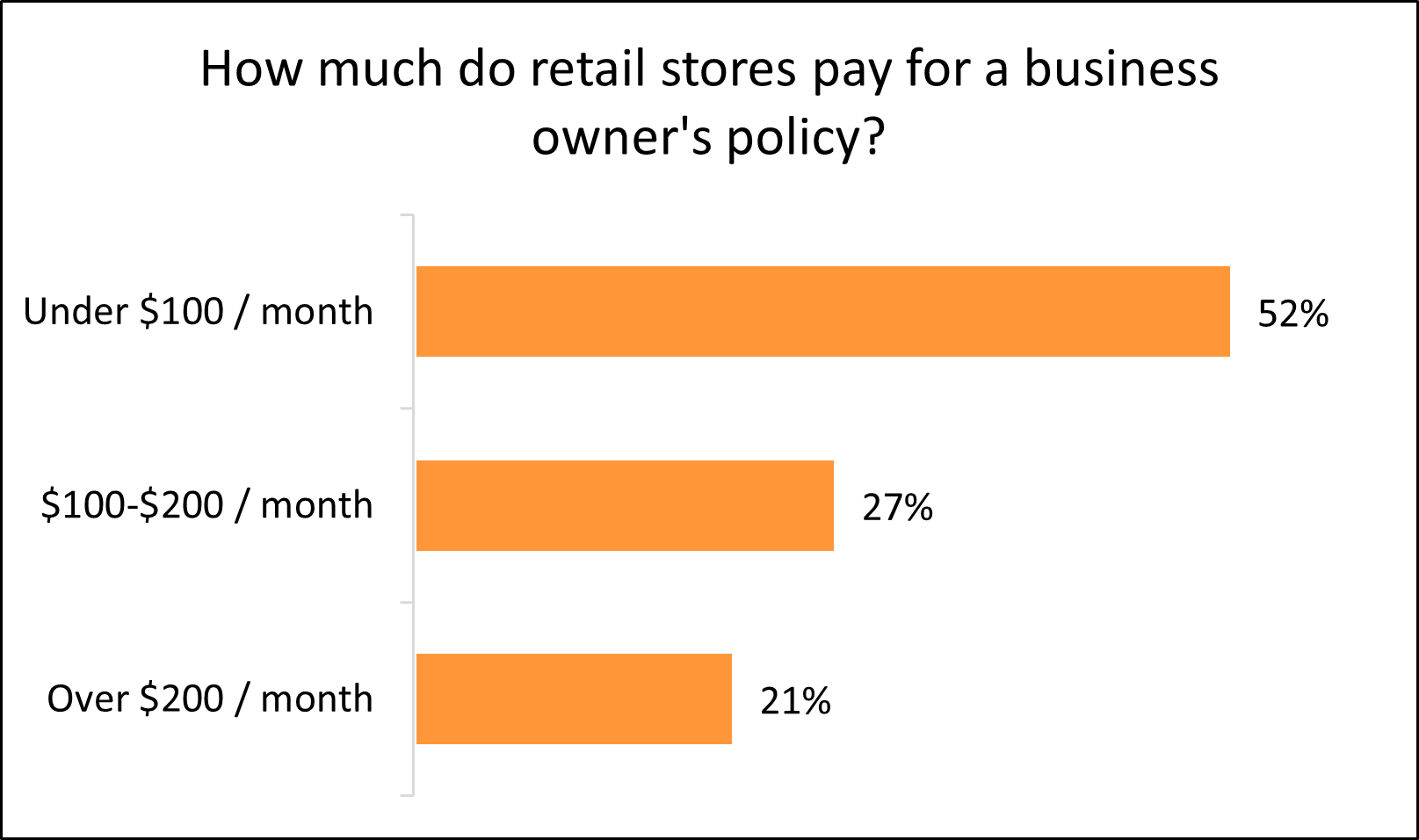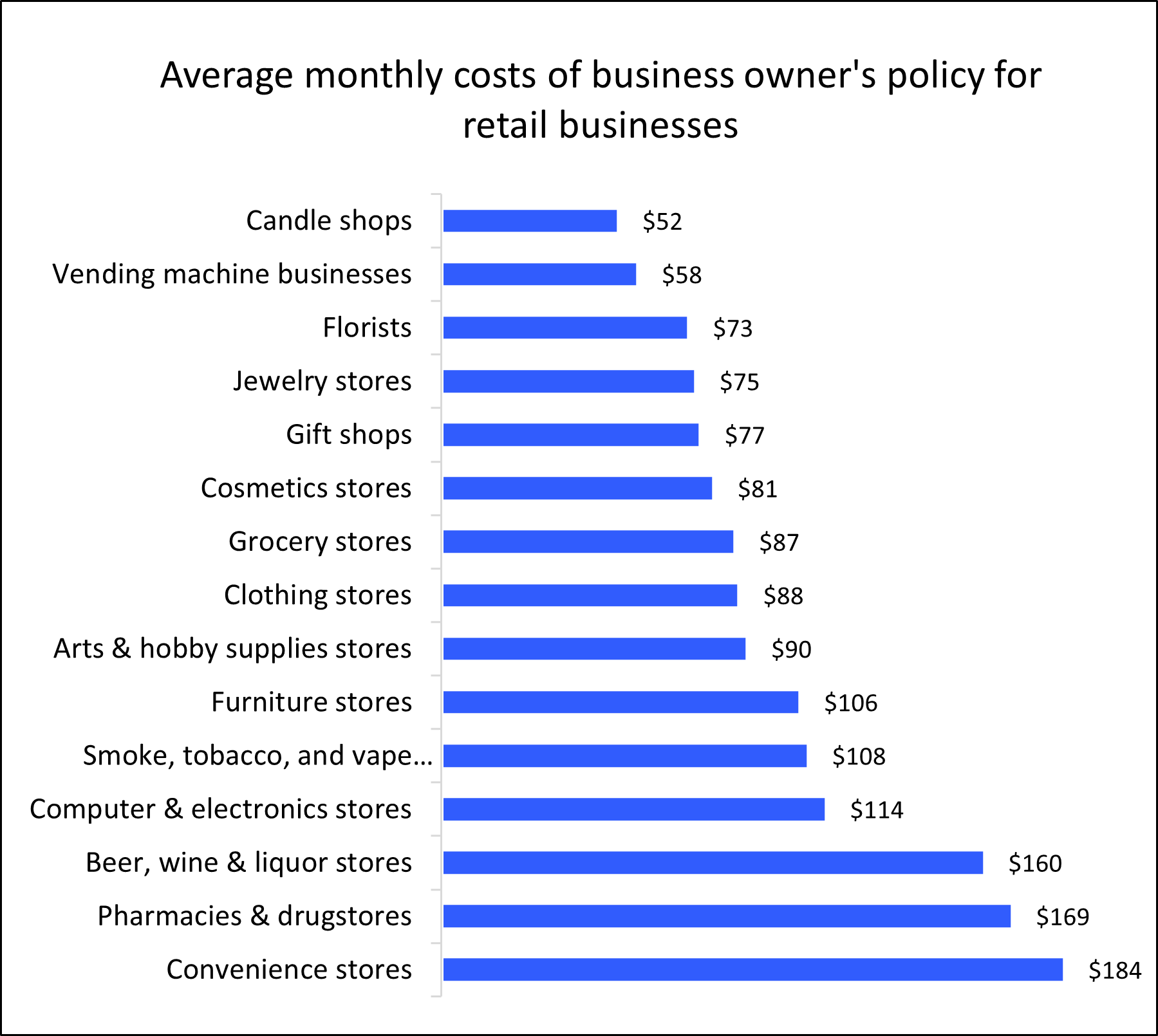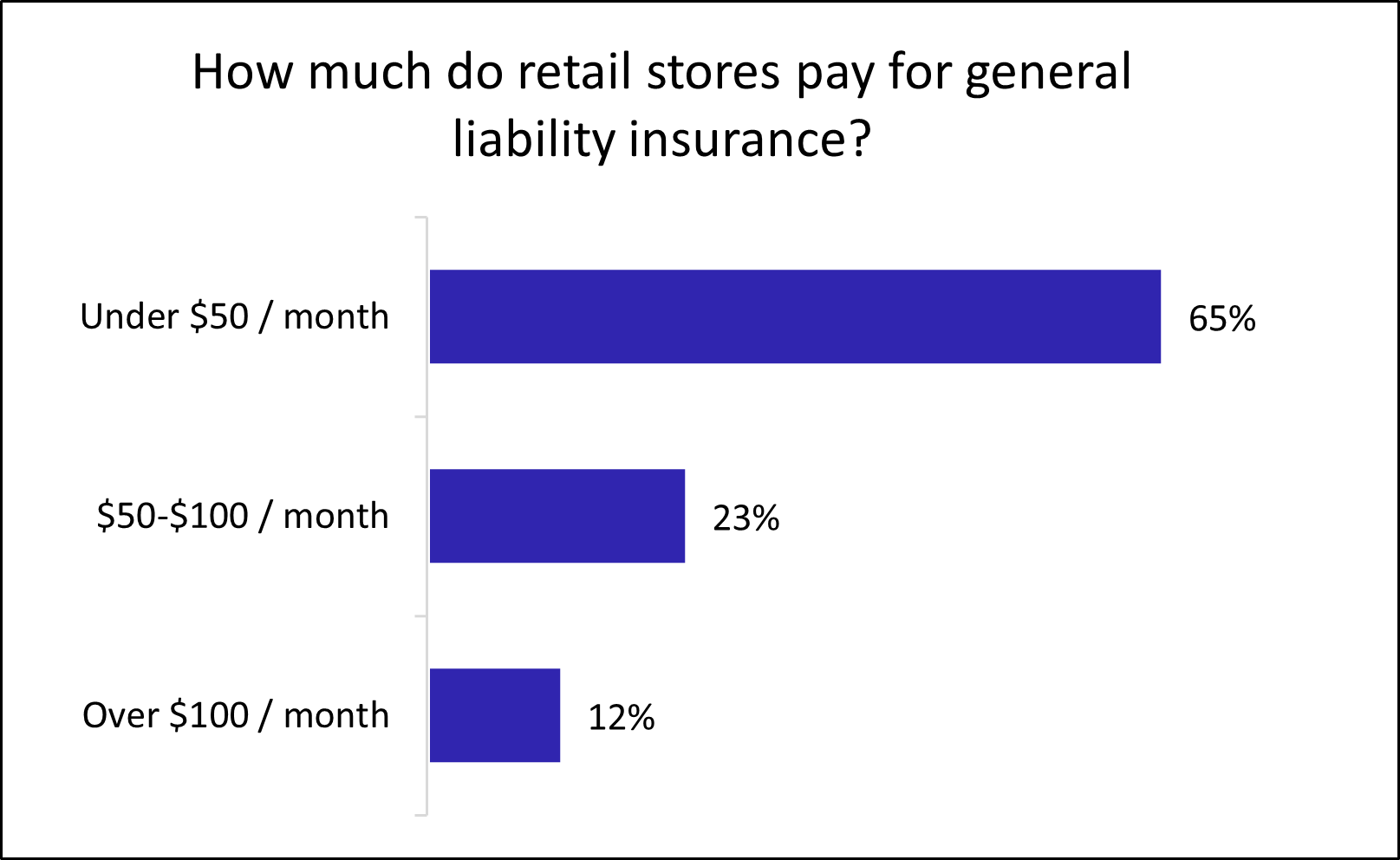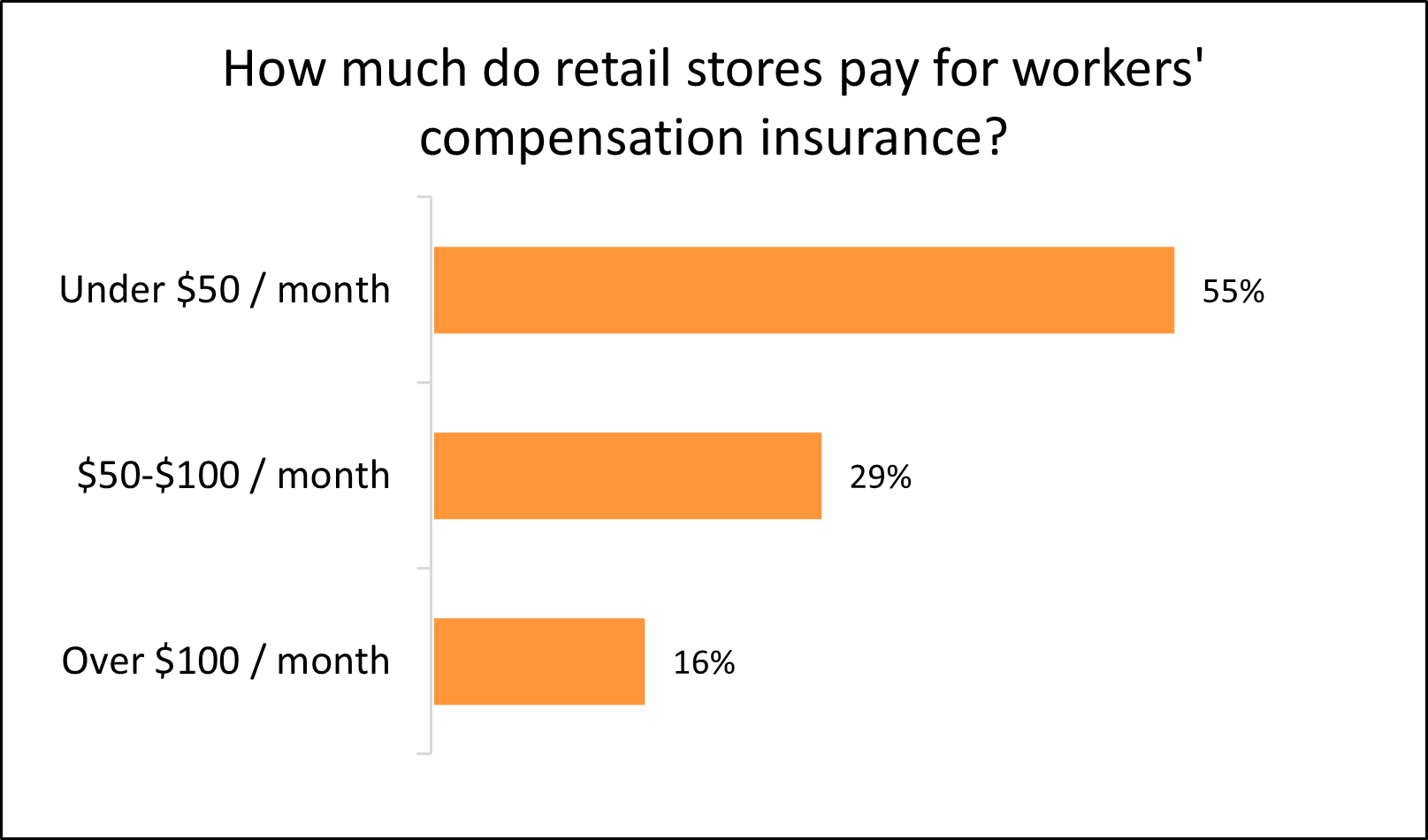
How much does business insurance cost for retail stores?
Several factors affect the cost of retail business insurance, including your store’s specialty, size, number of employees, and inventory. Cost estimates are sourced from policies purchased by Insureon customers.
Key insurance policies and their expected costs for retail stores
Here are the top commercial insurance policies purchased by retail businesses and their average monthly costs:
- Business owner's policy (BOP): $95 per month
- General liability insurance: $42 per month
- Workers' compensation insurance: $86 per month
- Liquor liability insurance: $28 per month
- Commercial umbrella insurance: $59 per month
- Commercial auto insurance: $171 per month
- Cyber insurance: $57 per month
Our figures are sourced from the median cost of small business insurance policies purchased by Insureon retail customers. The median offers a better estimate of what your business is likely to pay because it excludes outlier high and low premiums.
Business owner’s policy
Retail businesses pay an average of $95 per month, or $1,136 per year, for a business owner’s policy.
A business owner's policy, or BOP, bundles general liability coverage with commercial property insurance to cover both third-party risks and your business property. It typically costs less than purchasing each policy separately.
A BOP protects against customer injuries and property damage, along with damage to your retail equipment and inventory. Because of its increased coverage and affordability, it’s the policy most often recommended by Insureon’s agents.
This is the average BOP for retail businesses that buy from Insureon:
Insurance premium: $95 per month
Policy limits: $1 million per occurrence; $2 million aggregate
Deductible: $500
Small, low-risk retail businesses are often eligible for a business owner's policy.
Retail business owners may see higher costs if they choose to add endorsements to their policy. Insurance endorsements, such as business interruption insurance or equipment breakdown coverage, are often recommended to help avoid financial losses if a fire or power outage forces your business operations to cease for an extended period of time.
The cost of a business owner's policy is based on a number of factors, including the value of your property, where you are located, the number of employees you have, and your specialty.
Business property value drives the cost of a BOP
Among retail businesses that purchase a business owner’s policy with Insureon, 52% pay less than $100 per month and 79% pay less than $200 per month.
Businesses with large premises, such as a convenience store, typically pay more for a BOP than retail businesses with smaller premises, such as a compact florist shop. Your industry risk, years in operation, and claims history will also affect your premium.

Your type of business and location affect the cost of a BOP
Businesses that interact with many customers and have a higher risk of accidents and vandalism typically pay more for a business owner's policy.
For example, liquor stores can expect to pay more for a BOP than candle shops and other lower risk professionals. The average monthly cost for a liquor store is $160, while the monthly average for a candle shop is $52.
Other factors that affect the cost of your BOP premium include your business income, building maintenance, and the amount of coverage you purchase.
As you can see, the cost varies significantly across different retail professions:

Policy limits affect the cost of a business owner's policy
Policy limits are the maximum amounts your insurance company will pay for covered claims.
The per-occurrence limit is the maximum your insurer will pay for a single incident, while the aggregate limit is the maximum your insurer will pay on any claims during your policy period, typically one year. Higher limits cost more – and provide better coverage.
Most retail businesses (85%) choose business owner's policies with a $1 million per-occurrence limit and a $2 million aggregate limit. As your small business grows, you may need to expand your policy limits.
General liability insurance
Retail stores pay an average of $42 per month, or $500 per year, for general liability insurance.
A general liability policy helps cover legal fees related to common third-party lawsuits from clients, including those related to customer bodily injury, damage to a client's property, and advertising injury.
General liability coverage often includes product liability insurance, which can help protect your retail business in the event that a customer becomes ill from one of your products.
This is the average general liability insurance policy for retailers who buy from Insureon:
Insurance premium: $42 per month
Policy limits: $1 million per occurrence; $2 million aggregate
The cost of general liability insurance depends on several factors, such as the coverage limits you choose, the size of your business, the amount of foot traffic you have, and any endorsements you may add, such as an additional insured.
Your business risks are a large factor in determining general liability costs
General liability insurance costs depend on your risk of a customer lawsuit.
Among retail businesses that purchase general liability insurance with Insureon, 65% pay less than $50 per month and 88% pay less than $100 per month.
Across all retail professions, learn how to find affordable general liability insurance.

Workers’ compensation insurance
For retail companies, workers’ compensation insurance costs an average of $86 per month, or $1,036 per year.
This business insurance coverage helps pay for medical expenses when an employee is injured on the job. It also provides disability benefits while they're recovering and unable to work.
To comply with your state’s requirements and avoid penalties, retail businesses typically must purchase this coverage for their employees. It's also recommended for sole proprietors, as health insurance plans can deny claims for medical bills when an injury or illness is related to your job.
Most policies include employer's liability insurance, which covers the cost of lawsuits related to employee injuries. There's usually no limit to how much a workers' comp policy can pay for employee benefits, though it depends on state laws.
The cost of workers' compensation insurance depends on several factors, including the number of employees you have and the level of risk involved with their jobs.
Get more information on how to find affordable workers' compensation coverage.
The cost of workers’ comp depends on the number of employees
Among retail companies that buy workers’ compensation insurance with Insureon, 55% pay less than $50 per month and 84% pay less than $100 per month.
Workers' comp costs depend on the number of employees you have in your small business. A larger workforce brings a higher risk of worker injuries, which is why bigger businesses tend to pay more for this type of insurance.


Liquor liability insurance
The average cost of liquor liability insurance is $28 per month, or $336 annually, for retail businesses.
Liquor liability insurance offers crucial coverage for small businesses that sell alcohol. It provides protection if you sell alcoholic beverages to a customer, who then becomes intoxicated and causes injuries or property damage.
If you sell or serve alcohol at your retail business, state law often requires this policy in order to receive a liquor license.
In addition, many states have dram shop laws that hold a business liable for any damages caused by an intoxicated customer that they served, which can make this coverage all the more important to protect retail businesses against the expensive fallout from an incident.
The average liquor liability policy for retail small business owners who buy from Insureon is as follows:
Insurance premium: $28 per month
Policy limits: $1 million per occurrence; $2 million aggregate
A number of factors will influence the cost of liquor liability coverage, including the type of business you have, where your business is located, your claims history, and revenue from alcohol sales by your business.
Commercial umbrella insurance
Retailers pay an average of $59 per month, or $707 annually, for commercial umbrella insurance, which is available in $1 million increments.
This policy boosts the protection of your general liability insurance, commercial auto insurance, and employer's liability insurance. When a claim exceeds the limits of the underlying policy, umbrella insurance kicks in to provide coverage.
Retail businesses may need this type of insurance if a landlord requires liability coverage in excess of $2 million.
For example, a landlord might require you to carry $3 million in general liability coverage before they'll sign a lease. In that case, you could carry $2 million in general liability insurance along with a $1 million umbrella policy to meet this requirement.
The cost of umbrella insurance depends on your risks and how much coverage you buy. You need to buy a certain amount of underlying coverage before you can purchase umbrella insurance.
Commercial auto insurance
Retail companies pay an average of $171 per month for commercial auto insurance, or $2,054 annually.
Most states require this coverage for vehicles owned by a retail business. For personal, rented, and leased vehicles used by your business, look to hired and non-owned auto insurance (HNOA) instead.
A commercial auto policy provides financial protection in the event of an accident involving your business vehicle. It can help pay for property damage, medical costs, and legal expenses.
The cost of commercial auto insurance depends on several factors, including the policy limits you choose, coverage options, the value of the vehicles, and the driving records of anyone permitted to drive.
Learn more about how to find affordable commercial auto insurance coverage.
Cyber insurance
Retail business owners pay an average of $57 per month, or $683 annually, for cyber insurance. You might also see this policy called cyber liability insurance or cybersecurity insurance.
Cyber insurance helps retail businesses recover financially after a data breach or cyberattack. It can help pay for customer notification costs, fraud monitoring services, and other costs necessitated by state data breach laws.
The cost of cyber insurance depends on the amount of personal information handled by your retail business, such as customer credit card numbers, along with the number of employees who can access that information.
Top retail stores we insure
Don't see your profession? Don't worry. We insure most businesses.
How do you buy retail store insurance with Insureon?
Insureon works with top-rated U.S. providers to find affordable insurance coverage for your retail business, whether you work independently as a crafter, or own a grocery store with several employees.
Apply today to get free quotes with our easy online application. A licensed insurance agent who specializes in your profession's unique risks will help you find the right types of coverage for your retail business needs. They can also discuss retail store insurance costs and which types of business insurance options best fit your budget.
Typically, you can get a certificate of insurance within 24 hours after submitting an application, offering instant peace of mind.
















































